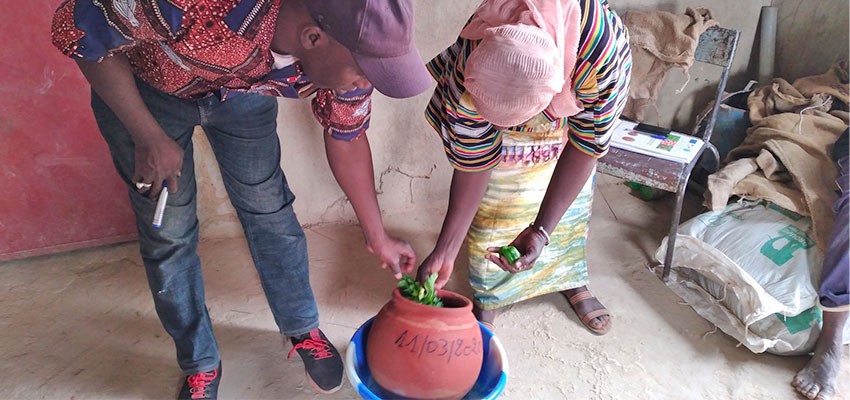
This summer, as a D-Lab Monitoring, Evaluation, and Learning (MEL) Fellow, I had the opportunity to work with the Evaporative Cooling research team. In this role, I supported the team as they began mapping out their longer-term objectives and planning how to improve data collection tools used to capture learnings from this project.
Before the MEL fellowship, I was interested in the role of monitoring and evaluation specifically in relation to issues of power and equity within the realm of development. Working with the evaporative cooling research team and their partner organizations Institut d’Economie Rurale and the World Vegetable Center allowed me to see how principles of participatory design can change the narrative concerning funding streams and user input. Having dialogues with the stakeholders on usability helped me understand how the development sphere has the potential to become more inclusive.
Over the past five years, the clay pot coolers project and research team have evolved from a research project focused on measuring the performance and investigating the suitability of clay pot coolers into a dissemination project that is now focused on encouraging widespread adoption of clay pot coolers. This phase of the project aims to raise awareness and build local capacity to construct and sell clay pot coolers within the Mopti region of Mali. This summer, I worked closely with the project team, including the research and development teams from the World Vegetable Center and Institut d’Economie Rurale. In our monthly meetings, we coordinated on future research objectives, the current status of key program components, and the timeline of the upcoming projects. Hearing about the challenges that the partners based in Mali faced, brought a human element into the data analysis, which can often seem far removed in many projects.
This summer, I thought a lot about the protocols and practices of gathering data and the best practices for doing so, given the country's specific context. I thought about how making sense of data can tell a story about the impact or importance of a project, whom the clay pot coolers are impacting, and how we can make the project more effective and efficient. In one specific instance, I interviewed one of the project contributors, Boureima Djiguiba, about his experience leading training sessions but also about areas and practices that could be improved throughout the feedback interviews. Most notably, from this interview, we learned about the types of questions that people preferred--fewer open-ended questions and more yes/no questions. The relevance of this insight allowed the team to then think about how they might structure follow-up interviews and train the trainers to administer the interviews for maximum impact.
I have appreciated the experience of working on the clay pot cooler project at MIT D-Lab. I learned a lot about project management across multiple teams, monitoring and evaluation for scale, and clay pot cooler technology itself. Here are some key takeaways I gleaned from working with the clay pot coolers team:
- Be specific. Keeping track of data, interviews, teams, and goals is extremely important for the project’s success and for meeting the expectations of key stakeholders.
- Communication is key. It’s an age-old adage, but communication is more effective when it is frequent and regular.
- Creativity is an asset. Problem-solving is a significant component of any project. When timing doesn’t work out, or there are circumstances beyond the control of the program team, thinking creatively and out of the box is key.
About the author
Kerong Kelly was a fellow this summer at MIT D-Lab, focusing on the Clay Pot Cooler Project. She currently is a second-year MPA student at Columbia University’s School of International and Public Affairs.
More information
MIT D-Lab Evaporative Cooling for Vegetable Preservation
Contact
Eric Verploegen, MIT D-Lab Affilated Researcher

